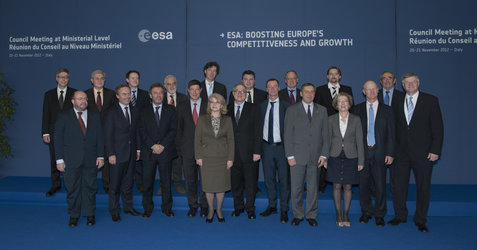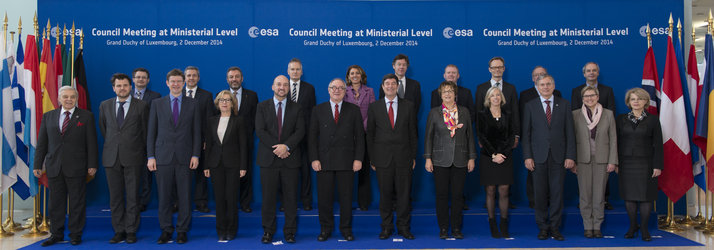Accept all cookies Accept only essential cookies See our Cookie Notice

About ESA
The European Space Agency (ESA) is Europe’s gateway to space. Its mission is to shape the development of Europe’s space capability and ensure that investment in space continues to deliver benefits to the citizens of Europe and the world.
Highlights
ESA - United space in Europe
This is ESA ESA facts Member States & Cooperating States Funding Director General Top management For Member State Delegations European vision European Space Policy ESA & EU Responsibility & Sustainability Annual Report Calendar of meetings Corporate newsEstablishments & sites
ESA Headquarters ESA ESTEC ESA ESOC ESA ESRIN ESA EAC ESA ESAC Europe's Spaceport ESA ESEC ESA ECSAT Brussels Office Washington OfficeWorking with ESA
Business with ESA ESA Commercialisation Gateway Law at ESA Careers Cyber resilience at ESA IT at ESA Newsroom Partnerships Merchandising Licence Education Open Space Innovation Platform Integrity and Reporting Administrative Tribunal Health and SafetyMore about ESA
History ESA Historical Archives Exhibitions Publications Art & Culture ESA Merchandise Kids Diversity ESA Brand Centre ESA ChampionsLatest
Space in Member States
Find out more about space activities in our 23 Member States, and understand how ESA works together with their national agencies, institutions and organisations.
Science & Exploration
Exploring our Solar System and unlocking the secrets of the Universe
Go to topicAstronauts
Missions
Juice Euclid Webb Solar Orbiter BepiColombo Gaia ExoMars Cheops Exoplanet missions More missionsActivities
International Space Station Orion service module Gateway Concordia Caves & Pangaea BenefitsSpace Safety
Protecting life and infrastructure on Earth and in orbit
Go to topicAsteroids
Asteroids and Planetary Defence Asteroid danger explained Flyeye telescope: asteroid detection Hera mission: asteroid deflection Near-Earth Object Coordination CentreSpace junk
About space debris Space debris by the numbers Space Environment Report In space refuelling, refurbishing and removingSafety from space
Clean Space ecodesign Zero Debris Technologies Space for Earth Supporting Sustainable DevelopmentLatest
Applications
Using space to benefit citizens and meet future challenges on Earth
Go to topicObserving the Earth
Observing the Earth Future EO Copernicus Meteorology Space for our climate Satellite missionsCommercialisation
ESA Commercialisation Gateway Open Space Innovation Platform Business Incubation ESA Space SolutionsLatest
Enabling & Support
Making space accessible and developing the technologies for the future
Go to topicBuilding missions
Space Engineering and Technology Test centre Laboratories Concurrent Design Facility Preparing for the future Shaping the Future Discovery and Preparation Advanced Concepts TeamSpace transportation
Space Transportation Ariane Vega Space Rider Future space transportation Boost! Europe's Spaceport Launches from Europe's Spaceport from 2012Latest
ESA Euronews: The Ministers of Space
Thank you for liking
You have already liked this page, you can only like it once!
The Italian city of Naples was the dramatic setting for a summit to set Europe’s future in space. From rocket launchers to Mars explorers, everything was under debate – in particular, money. Ministers from the 20 member countries of the European Space Agency, including newcomers Poland, had to decide which projects are funded and how. The bargaining was intense, according to Genviève Fioraso, French Minister for Higher Education and Research: “Tough! Negotiations are never easy. You don’t have much sleep, there are opposing points of view….even if everything is prepared in advance it’s like we’re starting all over again. But you have to just know that, no sleep for two and a half days, and be persuasive,” she commented. One of the key areas of debate concerned the future of Ariane. Late night negotiations led to a compromise, with the updated version of the launcher, known as Ariane 5ME, to go ahead, and be ready for lift off in 2017. At the same time initial studies to build Ariane 6, with a modular, flexible design, would be launched.
Some of the most enthusiastic support of space projects came from the British, who are increasing their investment in ESA by 25%. The UK is targeting telecommunications: “quite simply we think the satellite-based delivery of television, or broadband services, is a growing market, and we want Britain to be at the cutting edge of it”, explained Minister of State for Universities and Science, David Willetts. But what about the science, amongst all this talk of money and market share? ESA member countries have to fund science, it is non-optional. However the science budget will not budge from its current 508 million euros per year. ESA left the Naples summit with the cash and political support for a 10.1 billion euro space programme for the coming few years.
-
CREDIT
ESA -
LICENCE
ESA Standard Licence
-
Documentary
-
-
David Willetts (Minister of State for Universities and Science, UK) Francesco Profumo (Italian Minister for Education, Universities and Research) François Biltgen (Luxembourg Minister for Higher Education and Research) Genevieve Fioraso (Minister for Higher Education and Research , France) Mauro Dell’Ambrogio (Swiss State Secretary for Education and Research)
-
-
-
-
-

European ministers and representatives at Ministeria…

Jean-Jacques Dordain and Geneviève Fioraso

Jean-Yves Le Gall and Geneviève Fioraso

European ministers and representatives at the ESA Co…















 Germany
Germany
 Austria
Austria
 Belgium
Belgium
 Denmark
Denmark
 Spain
Spain
 Estonia
Estonia
 Finland
Finland
 France
France
 Greece
Greece
 Hungary
Hungary
 Ireland
Ireland
 Italy
Italy
 Luxembourg
Luxembourg
 Norway
Norway
 The Netherlands
The Netherlands
 Poland
Poland
 Portugal
Portugal
 Czechia
Czechia
 Romania
Romania
 United Kingdom
United Kingdom
 Slovenia
Slovenia
 Sweden
Sweden
 Switzerland
Switzerland






























